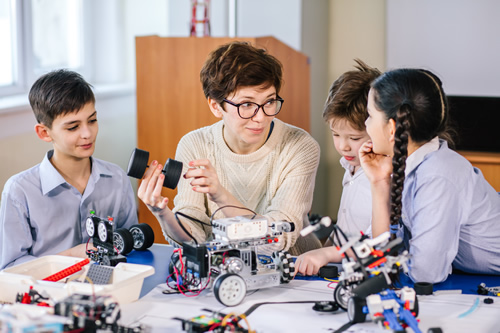
Breaking Boundaries: MIT’s Innovations in Biology Research
I’m amazed – the robots are changing lots of jobs and finding brand new ways to solve tough stuff.
Thank goodness – I can’t wait to see the science secrets we unlock next!
The Intersection of AI and Biology
We blend AI and biology; it isn’t new; MIT’s efforts really jump forward. By using artificial intelligence, the many possibilities of mixing it with biology were recognized by MIT for sorting out life’s complex parts; this was deemed big. Highlighting how ground-breaking the work is considered some advancements from the effort can now accelerate learning of life’s complex design. Raw data in biology research gets tangled in a big web of complexity, usually slow Goes MIT’s study uses AI smartly – giving fresh ways to understand bio-trouble. Boldly, I note – MIT’s work could speed up science with AI. Here’s what’s cool – MIT uses AI to help us get biology better, fast.
Breaking Down Biological Barriers
We face a challenge; it’s big; it’s about data. This challenge is approached by MIT’s system—which utilizes AI models to handle large datasets quickly—ensuring that analysis and interpretation are achieved with much greater efficiency than had been possible before. I think it’s amazing!
The Genesis of MIT’s AI System
MIT’s foray into revolutionizing biology research through AI began with a multidisciplinary team of scientists, combining expertise in biology, computer science, and machine learning. The collaboration aimed to develop a system that could seamlessly integrate with existing research methodologies while enhancing the speed and depth of analysis.
The system’s genesis involved training AI models on diverse biological datasets, encompassing genomics, proteomics, and other key domains. This training process equipped the AI system with the ability to recognize patterns, make predictions, and derive meaningful insights from complex biological data.
Unveiling the Power of Predictive Analytics
A cornerstone of MIT’s AI system is its emphasis on predictive analytics. By harnessing the predictive power of AI models, researchers can anticipate biological trends, identify potential pathways for further investigation, and streamline the decision-making process in experimental design. This predictive capability not only expedites the research cycle but also enhances the likelihood of uncovering novel biological phenomena.
Empowering Researchers with User-Friendly Interfaces
Recognizing the diverse backgrounds of researchers in biology, MIT’s AI system is designed with user-friendly interfaces, ensuring accessibility for scientists with varying levels of computational expertise. This democratization of AI tools in biology research empowers researchers to leverage the benefits of advanced technology without the need for extensive programming skills.
Accelerating Drug Discovery and Development
This acceleration is crucial in the race against time, particularly in addressing emerging health threats and combating diseases with limited treatment options.
Ethical Considerations in AI-Driven Biology Research
As AI becomes increasingly integrated into biology research, ethical considerations come to the forefront. MIT’s scientists acknowledge the importance of responsible AI use and emphasize the need for transparent practices in data collection, model training, and decision-making processes. Striking a balance between innovation and ethical considerations is paramount to ensuring the positive impact of AI in the field of biology.
Challenges on the Horizon
While MIT’s AI system represents a monumental leap forward, challenges remain on the horizon. A Roadmap through the Information Maze ,The dynamic nature of biological systems introduces a level of complexity that AI models may struggle to fully comprehend. Ongoing research and iterative improvements will be essential to refining the capabilities of AI in tackling the ever-evolving challenges of biology.
Conclusion
MIT’s groundbreaking system for generating AI models is poised to usher in a new era for biology research. By seamlessly integrating AI into the research process, MIT scientists have set the stage for a paradigm shift, accelerating the pace of discovery and unlocking the full potential of biological data. The marriage of AI and biology is not just a collaboration; it’s a revolution that holds the promise of transforming the way we understand and interact with the biological world.
Leave a Reply